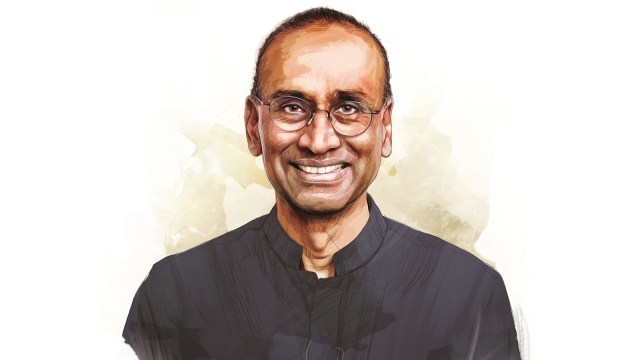Venki Ramakrishnan at Idea Exchange: ‘Many things that cause ageing may have evolved as mechanisms to prevent cancer’’
CRISPR is simply the current prevailing form of gene therapy. It was not the first, and it’s not going to be the last either. People may discover other ways of doing gene therapy that are actually an advance over CRISPR.
 VenkI Ramakrishnan
VenkI RamakrishnanIndia-born Nobel Prize-winning molecular biologist Venki Ramakrishnan on the genetic basis of ageing, gene therapy, how scientists prioritise research areas and learnings from the Covid pandemic.
This Idea Exchange was moderated by Amitabh Sinha, Deputy Editor, The Indian Express
Amitabh Sinha: In Why We Die (Hachette India/Hodder & Stoughton) you discuss the processes that go on inside our bodies when we age and die. Why do you think it’s necessary for people to know this?
I don’t think people need to know. You can sail through life without actually knowing what happens. But it’s been an existential question. Humanity has wondered about why we age and die ever since we became aware of mortality. We may be the only species that is aware of mortality. If you look at religions, for example, they all have different ways of dealing with death. People have also tried to figure out how to extend life and stay healthy.
The thing that has changed in the last few decades is that molecular biology is coming up with real scientific answers to the question of why we age. What happens as we age? What are the causes? What sends you over the edge into death? I thought this was a good time to take stock of what’s going on.
Amitabh Sinha: You talk about extending life spans further but stop short of saying how long could that be possible. What is the limit we know we can live up to — 150 to 200 years?
The oldest person on record to have lived is a French woman named Jeanne Calment, who passed away in 1997 at the age of 122. There have been a couple of people who’ve lived to be 119 years. Somewhere between 115 to 120 years seems to be the limit of current longevity in humans. Whether this natural limit can be exceeded is a matter of debate. No physical or chemical law says it can’t be exceeded because there are species that live to be 300 or 400 years old, such as certain kinds of whales and sharks. There are giant tortoises that live to be almost 200 years old.
On govt & scientists: You should have a certain fraction of people who are going into fundamental science and mathematics… The administration of these entities should be free of politics and be independent
Story continues below this ad
But whether we can alter our natural biology to live beyond that is still an open question, and it would require some fundamental breakthroughs in slowing down or reversing the ageing process.
Amitabh Sinha: A significant increase in average life expectancy would mean a rise in global population, isn’t it?
It is not a given that if you increase life expectancy, you’re going to have population increase. If you look at history, when there were big advances in health, for example, the invention of fertilisers allowing greater food supply, and the discovery of antibiotics and vaccines, all of those increased our life expectancy. The population did go up but then it stabilised at a higher level because birth rates fell. Inevitably, this is what happens.
Today, fertility rates are dropping all over the world. Japan, in the last few decades, has increased its overall life expectancy, yet its population is not going up. However, if it doesn’t go up, then the flip side is that you will have a very long time between generations because fertility rates will go down, people will have fewer children, and the same people will live for a long time, and the replacement will be slower. That could lead to a stagnant society.
Leena Misra: How do scientists prioritise research areas? How do they decide whether they should be trying to increase life expectancy or working to eliminate diseases?
Research priorities are typically determined by two things. One is, what is possible? Where can you make meaningful advances? And, secondly, what are the priorities of governments and funding agencies? Ideally, it is not the job of governments and funding agencies to tell scientists how to do their job. They’re not really qualified to do that. But they’re the ones running the government.
On increasing life expectancy: If people are living longer, the only solution is to make sure that they can stay healthy and independent for a large fraction of their lives so that they don’t require care. The number of years that they require care should be minimised
Often, they’re the ones who’ve been elected by the people. So, it is their right to say that our top priority is to solve the food security problem, or sustainable energy, or cancer, infectious disease or childhood diarrhoea. They may tell scientists these are the areas and you tell us how to address these problems. And scientists have to figure out ways to do it.
The reason that ageing research is becoming better-funded now is that societies are facing an older population and nobody wants them to live in misery. They also don’t want them to be a burden on the rest of society.
Amitabh Sinha: One of the diseases that makes repeated mentions in your book is cancer. What makes cancer such an intractable disease?
Cancer and ageing are closely related. Many things that cause us to age may have evolved as mechanisms to prevent cancer early in life so that we’re able to grow and reproduce because evolution doesn’t care too much about what happens to you after you’ve grown up and reproduced. It doesn’t select longevity because it selects for the propagation of genes, for the survival of genes or what’s called fitness.
There have been tremendous advances in cancer. Some cancers, which used to be a death sentence, are now highly treatable. Occasionally, in many cases, it’s still a terrible disease. The reason it’s difficult is two-fold. One is that cancer is not a single disease. It may have a single root cause, which is a deregulation of our genetic programme and the programme of the cell. So, the cell becomes deregulated,
it then proliferates without control, takes over organs and tissues, and eventually kills the individual. But that root cause can manifest itself in many ways. So, that’s why we have all these many different types of cancer.
It’s a disease of our own cells. It’s not like a foreign organism, like a bacterium, that you can use differences between that organism and us to selectively kill the organism, like with antibiotics.
Ageing is the same problem. Ageing is really when our own cells become deregulated in some way. The programme is not working as efficiently as it was when we were younger. So that’s a hard problem as well. It’s also due to multiple causes. There’s DNA damage, there’s damage to our cellular components and our proteins and the way cells communicate with each other, the way things are modified, like our immune system. Maybe the underlying cause is still a breakdown in the genetic programme, but it has different manifestations and it’s our own cells. In that sense, they’re similar and that’s why they’re both hard to tackle.
Anuradha Mascarenhas: What about the efficacy of therapeutics, especially gene therapy, in ageing or cancer? How promising is research in this area?
Gene therapy is most effective for diseases where a defect in a single gene causes a disease. It is not particularly useful for things like cancer and ageing because although there may be a genetic component, it’s much more complex.
When they look at the genetic component of ageing, the heritability of ageing is only about 25 per cent. There are multiple causes. Some of it is simply random, what you call stochastic damage to our genes. Just because it damages your genes doesn’t mean it’s genetic in origin. It’s not something you inherit. This damage is random and accumulates. There are some genes which are over-represented in centenarians, for example. But it doesn’t mean that you can modify human beings to have that gene because that gene may be serving different purposes in old age compared to when you’re younger.
Manraj Grewal Sharma: Is there a way we can forecast a person’s lifespan from his genes, his molecular health and so on?
There definitely is a genetic component. But it’s not clear that people can sequence your genome and tell you how long you’re going to live. I don’t think we’re anywhere near that. I’m not even sure that will ever happen. Because there are so many other variables, like your lifestyle, environment, the circumstances of your birth, the circumstances of your mother when she was carrying you in the utero. All of those things count to your life potential.
Sunanda Mehta: Is it true that death anxiety is higher in the middle age group and recedes as one grows older?
I have not heard of that. What I do know is that the general dissatisfaction with life peaks when you’re in your 40s and early 50s.
So, there’s a sort of U-curve, with people happier when they’re very young. There’s a sort of general dissatisfaction around 40. As you get past 55-60, you feel okay again. What people have explained is that at 40 you realise you’ve sort of ended up where you’re going to be. You know that some of the dreams of your youth are no longer achievable.
Sometimes that’s hard to reconcile with. By the time you’re 60, you sort of accept it and are happy again. That’s the explanation I’ve seen.
Harish Damodaran: I was looking at the nightmarish situation where there are too many old people. The pension bill will mount because there are fewer people to work and more people to be taken care of.
I think this is one of the reasons why governments in developed countries are so interested in ageing research… One way to solve this problem, which is good for old people as well, is to ensure their good health, so that they can stay productive. They may not be able to do the same jobs that they did when they were younger, but they can be productive in different ways and contribute to the economy in different ways.
Amitabh Sinha: There have been some interventions in India in the last few years to correct some of the structural problems in scientific research. The establishment of the National Research Foundation, for example. Do you think these are steps in the right direction?
Encouraging young Indians to go into science is important because you cannot sustain a base of either technology or medicine without fundamental science. Even people who want to be engineers have to know fundamental physics, chemistry and mathematics.
Besides, applications really come from basic science. If you don’t have a base of scientists who understand what’s going on, even if the discoveries are made elsewhere, you won’t be able to exploit them on time and you will always be catching up. From that point of view, it’s good for the government to think about investing in science.
You should have a certain fraction of people who are going into fundamental science and mathematics. The exact mechanism is less important than trying to keep the administration of these entities free of politics and be
really independent. Governments elected by the people are the ones who have the right to set overall goals. The overall goal has to be broad, whether it’s improving agriculture, drought resistance, diseases, sustainable energy, whatever it is.
It’s then up to scientists to try to implement that. There’s a back-and-forth because governments may say we want to cure this disease. Scientists will say, okay, but then we need to understand the fundamental biology of this disease. So we have to do some fundamental biology first, then we can start understanding how this disease works. Both sides have to respect each other. Scientists also can’t say we want to just do what we want because they’re being funded by taxpayers.
Gopal B Kateshiya: We have a lot of caregivers from Gujarat going to other countries to take care of the elderly there. Given your research, what do you think are the learnings?
If we have an increasing fraction of old people and all of them are dependent and require care and you’re also not having a great supply of younger people to take care of them, that’s going to be a real problem for society. Economically, there’s a cost as well.
So if people are living longer, the only solution is to make sure that they can stay healthy and independent for a very large fraction of their lives so that they don’t require care. The number of years that they require care ideally should be minimised. This could happen if there’s a natural limit to our lifespan. But if you increase health span, which is a fraction of years that you’re living healthily, the number of years that you require care can actually diminish. That’s the only way that this will work. If you simply extend lifespan and then have a bunch of older people needing care, that’s not going to work. That is to some extent the situation today. The UK is full of caregivers from places like India, operating the care homes for older people here.
Amitabh Sinha: In this book, you have discussed stem cell research and cloning but you haven’t discussed CRISPR technology. Do you see that technology playing a role in health research? Also, what role can AI play in solving some of the intractable problems in biology?
CRISPR is simply the current prevailing form of gene therapy. It was not the first, and it’s not going to be the last either. People may discover other ways of doing gene therapy that are actually an advance over CRISPR. For example, there are already technologies like prime editing, which allow you to do gene editing.
Gene therapy is very good for correcting individual genetic defects. For instance, single gene defects that cause a disease, those are the first points of call for technologies like CRISPR. And CRISPR, of course, is a great research tool. If you want to understand how a gene functions, you can knock it out or replace it, and you can do a lot of interesting biology with CRISPR. It has a great potential for genetic defects and diseases. Whether it will have any use at all in ageing is not clear to me. Maybe, in the future, if we understand more about the genetic basis of ageing, there might be some potential use of it, but it’s not something immediate.
On lessons from covid: There are a lot of lessons that we’ve hopefully learnt, but I have a feeling that governments tend to deprioritise this sort of preparedness because it costs money to continually be prepared
Amitabh Sinha: It’s been two years since we have come out of the Covid pandemic. What are the lessons we have learnt in terms of public health, the challenges that it posed?
I think some countries have learnt lessons. East Asian countries dealt with the early stages of the pandemic better because they had experience with previous outbreaks like SARS. So when the pandemic started, they very quickly were able to implement testing and isolation, use preventives like mask wearing and social hygiene.
Countries differed very widely. New Zealand, for example, didn’t have much of a lockdown and, with very careful testing and isolation, was able to contain the pandemic in the early stages. Later, when the virus evolved to become extremely contagious, it became hard to contain. But the advantage of doing this in the early stages is that it buys you enough time to develop vaccines.
We’re also understanding how you can rapidly develop vaccines against potentially new infectious diseases. With Covid, we were somewhat lucky in that we knew what to make vaccines against because it’s exactly the same gene as SARS. It’s a spike protein and previous studies on SARS had shown that spike protein is the one that attaches to the receptor on the cell and makes it infectious. If it was a brand new virus, you would have to figure that out from scratch.
There are a lot of lessons that we’ve hopefully learnt, but I have a feeling that governments tend to deprioritise this sort of preparedness because it costs money to continually be prepared. You need to have surveillance machinery in place. You have to have PPE, masks, the preventive gear that people use, especially in hospitals. You have to have all the structures in place in the community to implement measures. All of that takes money to maintain.
I liken it to an insurance policy. You might say an insurance policy is a waste of money because most of us aren’t going to have a flood or a fire, but we all buy insurance. Similarly, many of us buy health insurance because even if we’re young, we may want to get health insurance. It’s something like that. You have to think of this as some long-term investment for the good of the country.
- 01
- 02
- 03
- 04
- 05































